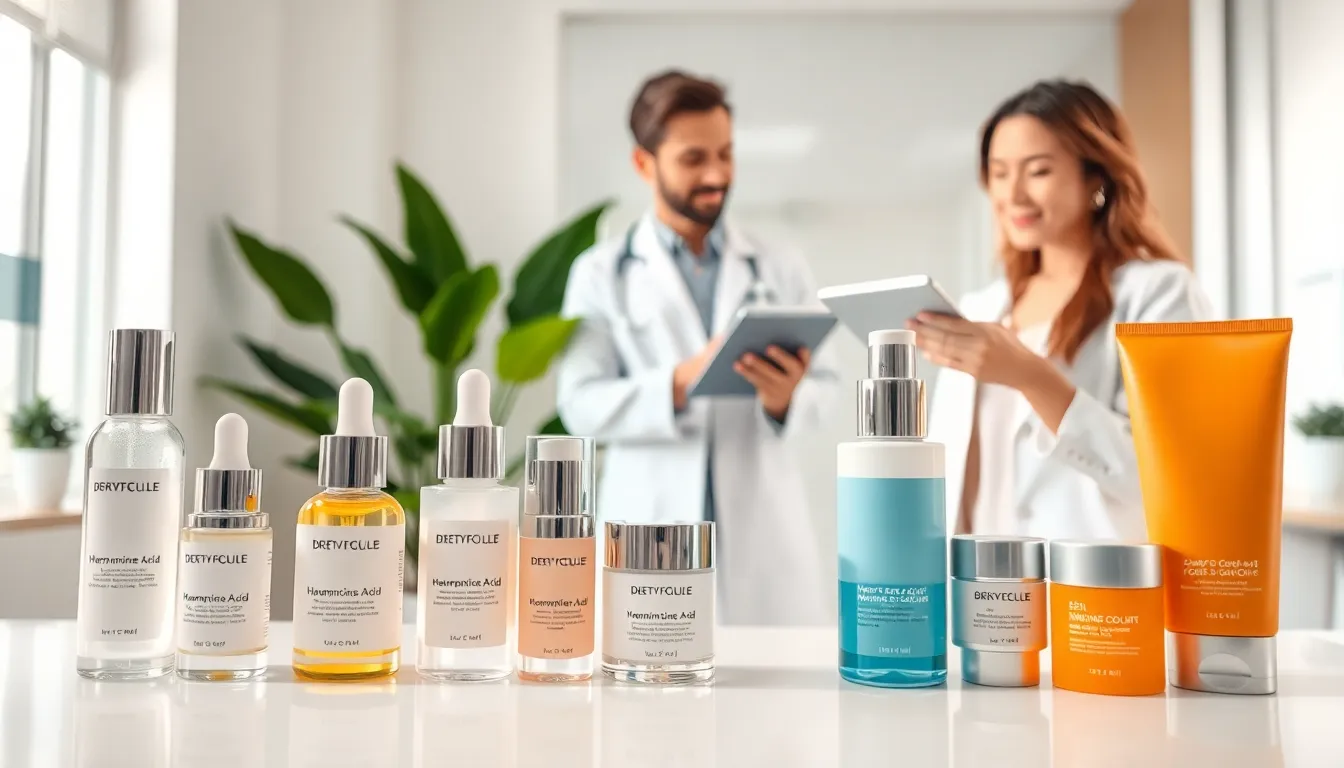Let’s be real, navigating the world of skin care can feel like wandering through a maze in the dark. With buzzwords flying, trends changing faster than a teenager’s mood swing, and products claiming to be the holy grail, where does one even begin? Fortunately, dermatologists have your back. They’ve meticulously sifted through the clutter to help you discover the best dermatologist recommended skin care products that actually work. Buckle up as we jump into the essentials your skin has been begging for.
Table of Contents
ToggleUnderstanding Skin Types

Understanding one’s skin type is the first step toward achieving radiant skin. Think of your skin as a canvas: different types require different brushes. Generally, skin can be classified into the following categories:
- Normal: Well-balanced, not too oily or dry. Feels comfortable and has an even tone.
- Oily: Prone to increased oil production, resulting in shiny skin and enlarged pores. Acne may also be a concern here.
- Dry: Lacks moisture and can feel tight or rough. Dry skin is often more sensitive to environmental changes.
- Combination: Displays characteristics of both oily and dry skin, typically with an oily T-zone and dry patches on the cheeks.
- Sensitive: Often reacts unfavorably to products, showing redness or irritation.
Knowing your skin type helps in selecting the right products. For instance, someone with oily skin should look for lightweight, oil-free formulations, while those with dry skin might benefit from richer creams. It’s important that everyone identifies their skin type to tailor their skin care routine accordingly.
Common Skin Concerns and Solutions
Every skin type comes with its unique set of challenges. Here’s a quick rundown of common skin concerns and their dermatologist-recommended solutions:
- Acne: For oily or acne-prone skin, products containing salicylic acid or benzoyl peroxide can work wonders. Cleansers with these ingredients help in unclogging pores and reducing breakouts.
- Aging: Fine lines and wrinkles got you down? Look for retinol-based products and antioxidant-rich serums that boost collagen production and help in cell turnover.
- Hyperpigmentation: Dark spots can be a pesky issue. Vitamin C serums and products containing niacinamide can effectively lighten pigmentation and brighten the complexion.
- Dryness & Flakiness: To combat dryness, opt for hydrating serums and thick moisturizers enriched with hyaluronic acid and glycerin. These ingredients lock in moisture effectively.
- Rosacea and Redness: Gentle, fragrance-free products with soothing agents like chamomile or centella asiatica can reduce inflammation.
By pinpointing individual skin concerns, individuals can explore targeted solutions tailored to their needs.
Key Ingredients to Look For
Knowing what goes into your products is just as crucial as the brand itself. Here are some superstar ingredients to keep an eye out for:
- Hyaluronic Acid: A hydration powerhouse that can hold up to 1,000 times its weight in water. It’s fantastic for all skin types, especially dry skin.
- Retinol: An anti-aging hero that boosts collagen production and reduces fine lines. Best used at night due to its phot sensitivity.
- Vitamin C: A potent antioxidant that brightens skin, evens tone, and combats free radical damage.
- Niacinamide: This versatile ingredient calms redness, reduces pore size, and enhances the skin barrier.
- Salicylic Acid: Perfect for combating oily, acne-prone skin. It gently exfoliates inside the pores and prevents breakouts.
When shopping, scrutinize labels for these key ingredients. They can make all the difference in achieving the skin of your dreams.
Recommended Product Categories
It’s always helpful to know what product categories dermatologists recommend. Here are essential categories to consider:
- Cleansers: Foaming cleansers for oily skin and creamy cleansers for dry skin can set the foundation of your routine.
- Moisturizers: Lightweight gel moisturizers for oily skin and thick creams for dry skin ensure hydration without clogging pores.
- Sunscreens: Daily SPF is non-negotiable. Look for broad-spectrum protection with SPF 30 or higher.
- Serums and Treatments: Targeted treatments can offer concentrated solutions. Choose based on specific needs, such as hydration or anti-aging.
- Exfoliants: Gentle exfoliation can brighten dull skin and improve texture. Products with AHA/BHA are particularly effective.
Selecting these categories carefully can streamline your search for effective skin care.
How to Build a Routine with Dermatologist Recommended Products
Creating a skin care routine doesn’t have to resemble rocket science. Here’s a streamlined approach:
- Cleanser: Start with cleansing to rid the skin of impurities. Apply morning and night.
- Toner: (Optional) A toner can balance your skin’s pH and prepare it for better serum absorption.
- Serum: Apply targeted serums next, focusing on specific concerns.
- Moisturizer: Lock in hydration with an appropriate moisturizer suited to your skin type.
- Sunscreen: In the morning, finish with sunscreen to protect against UV rays.
Stick with this structure, and you’ll see improvements over time. Consistency is essential in any skin care routine.
Maintaining Healthy Skin: Additional Tips
Beyond using dermatologist recommended products, here are additional tips for maintaining healthy skin:
- Stay Hydrated: Drinking enough water helps improve skin elasticity and overall texture.
- Balanced Diet: Nutrient-rich foods contribute to healthier skin. Consider incorporating plenty of fruits, vegetables, and healthy fats into your diet.
- Limit Sun Exposure: Sun damage can lead to premature aging. Seek shade and wear protective clothing whenever possible.
- Don’t Skimp on Sleep: Quality sleep allows your skin to repair itself, promoting better skin health.
- Regular Dermatologist Visits: Keeping up with regular check-ups can help address issues before they escalate.
Integrating these practices into one’s lifestyle significantly enhances skin health.



